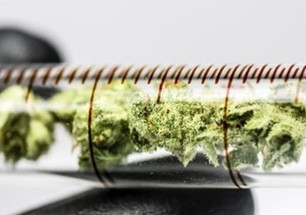Posted by Chrom Tech on 15th Oct 2025
The Role of Chromatography in Cannabis Testing
The use of cannabis in the United States continues to expand as more states legalize both medical and recreational consumption. With this growth, regulatory agencies have implemented mandatory testing requirements to ensure consumer safety. The 2018 Farm Bill further established that any cannabinoid derived from hemp is federally legal—provided it meets all production and THC concentration standards outlined in the legislation. To meet these strict quality and compliance demands, laboratories rely heavily on chromatography to test cannabis and hemp products.
Why Chromatography Is Essential in Cannabis Testing
Before cannabis products reach consumers, they must undergo rigorous analytical testing to verify purity, potency, and safety. Chromatography plays a vital role in this process by helping scientists and quality-control labs detect contaminants, measure cannabinoid concentrations, and profile complex chemical compositions.
Contaminant detection: As a plant-based material, cannabis can accumulate harmful pesticides, heavy metals, or residual solvents during cultivation and processing. Chromatographic techniques can identify and quantify these contaminants, even at trace levels.
Potency testing: Growers, manufacturers, and retailers rely on chromatography to determine the precise levels of tetrahydrocannabinol (THC) and cannabidiol (CBD). Accurate potency results ensure consumer transparency and proper product labeling while supporting consistent dosing and pricing strategies.
Regulatory compliance: For hemp-derived products, CBD formulations must contain less than 0.3% THC to comply with federal standards. Chromatographic analysis confirms that these products meet legal thresholds and labeling requirements.
Cannabinoid profiling: Cannabis contains hundreds of cannabinoids, each with unique therapeutic and pharmacological properties. Chromatography allows analytical labs to isolate, identify, and quantify these compounds—providing deeper insights into strain composition and potential medical applications.
Types of Chromatography Used in Cannabis Testing
Two main types of chromatography dominate the cannabis testing workflow: high-performance liquid chromatography (HPLC) and gas chromatography (GC). Each serves a distinct purpose depending on the target compounds being analyzed.
High-Performance Liquid Chromatography (HPLC)
HPLC is widely used for cannabinoid profiling and potency testing because it can measure compounds in their native, non-decarboxylated forms—without the need for heat. This allows for more accurate quantification of acidic cannabinoids such as THCA and CBDA. HPLC provides a detailed chemical fingerprint that supports regulatory compliance and quality assurance testing for both medical and recreational products.
Gas Chromatography (GC)
GC is commonly used for pesticide and residual solvent analysis. This method excels at detecting volatile and semi-volatile organic compounds that may remain from the cultivation or extraction process. Gas chromatography can also be applied in cannabis terpene analysis, which identifies aromatic compounds that contribute to a strain’s distinct scent, flavor, and potential therapeutic effects.
Ensuring Safe and Reliable Cannabis Testing
Chromatography has become indispensable in the cannabis industry, from growers and extractors to analytical testing laboratories. As legalization expands, the demand for precise and reproducible testing continues to grow. Reliable analytical instrumentation and consumables help ensure that every product meets safety standards and provides consistent, traceable results.
Researchers, growers, and regulatory testing labs trust Chrom Tech for their chromatography consumables and analytical supplies. Chrom Tech offers columns, vials, fittings, and other HPLC and GC accessories designed to deliver accurate, repeatable results—supporting laboratories involved in cannabinoid profiling, potency testing, and contaminant analysis.
Frequently Asked Questions About Cannabis Testing
Why is chromatography important in cannabis testing?
Chromatography allows laboratories to separate and identify chemical compounds in cannabis. It ensures accurate potency labeling, detects harmful contaminants, and verifies that products meet state and federal safety regulations.
What is the difference between HPLC and GC in cannabis analysis?
HPLC analyzes cannabinoids in their natural acidic forms without heat, making it ideal for potency and profiling tests. GC, on the other hand, uses high temperatures to detect volatile compounds such as pesticides, solvents, and terpenes.
What are the main benefits of using chromatography for cannabis testing?
Chromatography provides high sensitivity, reproducibility, and selectivity—helping labs ensure the accuracy and reliability of potency, purity, and contaminant testing results for all cannabis-derived products.

